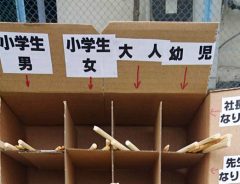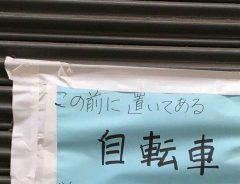
Source: xiangtao / PIXTA(ピクスタ)
Japanese Website Ranks Horrifying Shady Company Stories from the Chronically Overworked
- Source:
- Zanreko
- Tags:
- Black Companies / overwork / Society / Work
Related Article
-

Japanese School Festival Devises Genius Way to Stop Littering and Promote Democracy to Kids at the Same Time
-

Japan Railways To Implement Private Work Cubicles And Shared Work Spaces In Tokyo Train Stations For Lateworking Salarymen
-

“What can you do?” Boss talks to man about parental leave; His words move Twitter to tears
-

Japanese Hotel Apologizes For One Minute Internet Stoppage At 4:00 AM
-

Watch a Rogue Raccoon Terrify Onlookers in Downtown Tokyo
-

Shop Owner Comes Up With Genius Solution to Illegally Parked Bicycle Problem


Japan’s problem with overwork and unpaid, endless overtime is well documented. 'Karoshi' is the word for death by overwork and media often point to the fact that this word even exists as evidence that it's a normal part of Japanese worklife. Despite this, it seems depressingly little is done about Japan’s fatal overwork culture.
One organisation is hoping to draw more attention to the problem. They have created an app so that people can easily record their overtime and find out how much money they should be paid for it. To further prove the point, they asked for real life stories from Japanese workers about the conditions they face every day in ‘black companies’. ‘Black companies’ are those that don’t adhere to Japan’s labour laws, particularly concerning overtime payment and working hours. Sometimes they go as far as falsifying data on their employees working hours to get out of paying them what they deserve.
On this website the most horrifying of these stories are ranked one to seven, to demonstrate the awful conditions that some normal Japanese workers are forced to go through. These are the top 3 shocking testimonies.
1. Male, 20s, Miyagi Prefecture, IT and Telecommunications Industry
As a permanent employee our base (monthly) pay is 65,000 yen (about $650). I work every day from 8 am until 4 am the next morning. My time off is restricted to one Saturday morning a month and we aren’t given even 1 yen extra for our overtime. My actual hourly pay works out at 120 yen ($1.20). When I go to work, there’s times when I can’t return home for 3 months in a sort of semi-captivity. The estate agents and police even entered my home, suspecting I had died without anyone knowing.
Other employees have been hospitalised or died due to overwork. There are even sayings between the management like ‘Japan’s laws don’t apply in this company’ and ‘employees are consumables’.
Source: msv / PIXTA(ピクスタ)
2. Male, 20s, Osaka, Food Industry
In a world where over 100 hours of overtime (per month) is taken as the norm, the worst time was when I did over 200 hours for two months straight. Naturally, I’m not allowed to take a day off. On 3 hours sleep, knowing I might have to work for 24 hours, I ended up not taking a bath for 2 weeks. One day, I was speeding to the furthest away store that I’m in charge of and I got into a car accident in a tunnel. I was miraculously unhurt, but the car was wrecked to the point it couldn’t move. Looking back at the car as I continued on my way to work, I could only laugh.
3. Male, 20s, Osaka, Manufacturing Industry
They won’t let us wear protective masks when welding on the grounds that worker productivity will fall. My face gets burnt by the ultraviolet light, and even when I’m not welding I see flashes in my vision. At night if I turn in my sleep I get woken up from the extreme pain and the sleepless nights continue. Worse than that, when we work with a machine press, they remove the safety equipment saying we need to meet the deadline. Because of pain induced sleepless nights, I carry out my work drifting in and out of consciousness and one of my co-workers got his fingers crushed in the machine press. He should have been allowed to stop work, but in reality, the company covered the whole thing up without giving any compensation to him.
These extracts are from just three examples, but the website says they received over 300 stories, each one more unbelievably horrible than the last.
Aside from just raising awareness, the website provides links to employment services which find people jobs in reputable companies, as well as links to lawyers specialising in overtime pay disputes. Hopefully these shocking stories will show how widespread the issue is and encourage some long overdue change in Japanese work culture.